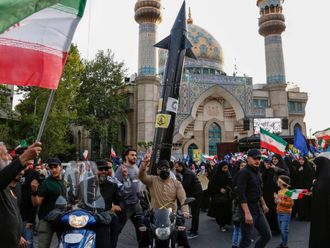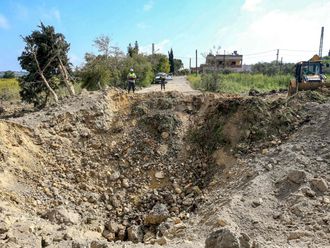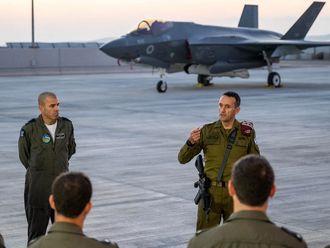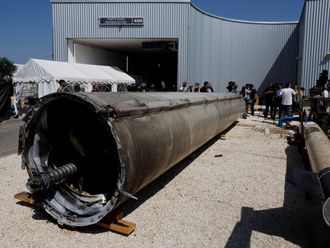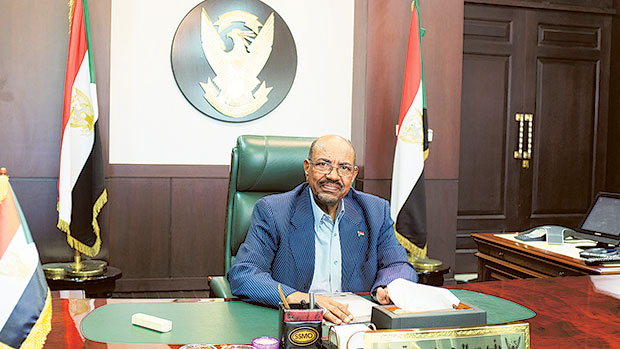
Khartoum: From his office overlooking this sprawling capital, Sudanese President Omar Hassan Bashir watched as his country seemed to fall off the world’s radar. For the only head of state with an outstanding arrest warrant from the International Criminal Court, it was welcome news - a sign that his accusers had moved on.
It might mean that US sanctions would be lifted, peacekeepers would depart and the world would be forced to acknowledge his claim about Darfur: that peace in the war-torn state, where Bashir is accused of having committed genocide and war crimes, was “getting wider and wider and deeper and deeper.”
That is not what is happening in Darfur, according to the United Nations and international aid agencies. This year, nearly half a million people were displaced in a region the size of Spain, and violence is the worst it has been in years.
But Bashir doesn’t buy those numbers or assessments, he said last week in his first interview with a US media outlet in more than five years. That vast gulf between how the world sees Darfur and how Bashir sees it reflects not only the controversial policies of the 70-year-old leader, but also the challenge of ending a protracted conflict whose very existence is still a source of controversy.
Now, Bashir has a demand: He wants the UN peacekeeping mission - the biggest in the world - out of Sudan.
“The area of peace has expanded in Sudan to the extent that there is no need for these forces to stay,” he said, adding that the UN is so weak that “even a pedestrian with a knife can take their weapons away.”
The United States and other nations have tried for years to marginalize Bashir. Because of the ICC warrant, he can visit only the few countries that have pledged not to arrest him. Because of US sanctions, credit cards do not exist in Sudan.
But during his 25 years in office, Bashir has nonetheless repeatedly found himself at the center of global events. For five years in the 1990s, his government gave refuge to Osama bin Laden. He presided over the only conflict in the 21st century that the White House has deemed a genocide. And in 2011, he agreed to allow the secession of South Sudan, the world’s youngest country, which promptly descended into chaos.
Now, as he gets ready for yet another term, Bashir is looking to throw out the UN mission while simultaneously pleading for the lifting of US sanctions. He says that the sanctions continue to damage his country’s economy and that he met American demands of not harboring terrorists, agreeing to the secession of South Sudan and signing the ultimately unsuccessful Darfur Peace Agreement.
But even as he articulates interest in re-engaging with the United States, at least economically, he derides the US interest in Darfur as a hollow political charade.
The conflict began in 2003, when rebel groups in Darfur rose up against Bashir’s administration for neglecting the region. The government responded by waging a brutal counterinsurgency campaign, mostly by employing Arab militias, dubbed the Janjaweed. That, too, is something Bashir denies.
More than a decade later, humanitarian aid workers’ access to Darfur is limited, with the Sudanese security apparatus sometimes flatly denying travel permits. In 2009, Bashir kicked out more than a dozen aid groups, accusing them of collaborating with the ICC. The departure of UN peacekeepers would be a victory for Bashir, but some aid officials argue that it would have disastrous implications.
“Without the United Nations-African Union Mission in Darfur, the Darfur situation would be worse than Rwanda of 1994,” said a senior UN official in Sudan.
The number of internally displaced people - 2.5 million, according to the UN, but only a fraction of that, according to the Sudanese government - is another topic that Bashir interprets in a wildly different way from the rest of the world.
“To them, it is an easy life,” he said of the displaced. “They would rather stay in these camps than go back and work.”
Bashir has refused to accept the international community’s explanation for what is happening in Darfur - that the region is unraveling and the Sudanese government is not only refusing to disarm key groups but also is actively abetting the conflict. In 2006, Congress voted to keep sanctions in place as long as that support continues, and it hasn’t reconsidered since.
In his leather armchair, Bashir shook his head at the idea that the US policy is grounded in reality.
“Unfortunately, the Darfur problem has become an internal United States issue to serve political ends,” he said, referring to President Barack Obama, who famously called Darfur a genocide when he ran for president in 2008.
These days, there are dozens of isolated intertribal clashes in Darfur, often over land and gold mining, and sometimes between members of the same ethnic group. Other conflicts rage in Sudan’s South Kordofan and Blue Nile states.
Allegations have emerged that Bashir and his government are more directly behind the surge in violence.
Over the past year, he has formed a group called the Rapid Support Forces (RSF), now the country’s best-armed and -outfitted unit, which has pursued Darfuri rebel groups, Bashir said.
“They were very successful,” Bashir said. “They dealt a very severe blow to the rebels in Darfur.”
But analysts say the RSF is effectively a better-funded version of the Janjaweed, burning villages and indiscriminately attacking civilians using many of the same fighters as the former militia.
“The RSF are indisputably a state organ on a publicly-vaunted state-directed mission to terrorize Sudan’s marginalized communities,” said a report from the Enough Project, a Washington-based nonprofit group.
Bashir denies those claims.
“Wherever they go, they are welcomed by the people,” he said. “They are commended by the people because they deliver services to the people.”
The fundamental goal of the security forces, he said, is to prevent civil unrest and hunt down those he refers to as “terrorists.” That’s why the RSF was created, he said, and that’s why, in September 2013, the Sudanese police and military killed dozens of civilians involved in anti-government demonstrations.
Bashir said the protesters were attempting to destroy government property and assaulting police.
“If these events happened in the United States, would the government allow people to go?” he asked. “Of course, we have examples in the United States. Even someone in his car who is asked to raise his hands and refuses, he will be shot. We’ve seen it. Especially if he is black.”
In spite of the many accusations against him, Bashir’s reign doesn’t appear to be nearing an end.
In 2011, he announced that he would step down from the presidency. But months later, he accepted his party’s nomination. In 2013, he said the decision to step down was this time “definite, God willing.”
A year later, he announced that he changed his mind yet again at the urging of his party. Elections are in April, and he stands almost no chance of losing, experts say.
Asked whether intends to be president for life, Bashir laughed.
“There are pressures from my own party and other Sudanese parties also, and I succumb to those pressures, but I hope as soon as possible I can find an exit out of this,” he said.
Earlier this year, Bashir made an attempt to hold a public conversation with his political opponents. He called it a “national dialogue” and held up the initiative as proof of his inclusive governing style.
But within weeks, instead of joining the dialogue, rebel groups and the unarmed political opposition in Sudan signed their own pact, pledging to “dismantle the one-party state regime.”
It appeared to be a blow to Bashir’s effort at a detente. But he brushed it off.
“I’m sure through time, when the process goes forward, many of them will come and join the process,” he said.


